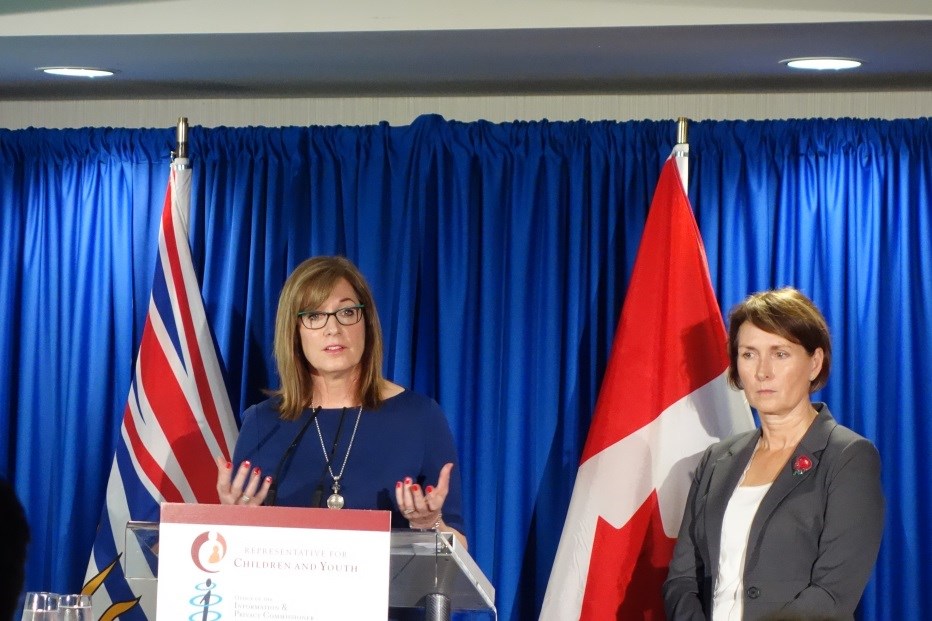At the #Privacyaccess2015 Conference: A look at the Youth, Privacy and Cyberbullying panel

“Children have the ability and resiliency to protect themselves and others and to alter their own behaviour once they are effectively informed about the risks. We should be empowering children at an early age to become good digital citizens and make informed and responsible choices when they use online media” – Marvin Bernstein, UNICEF Canada
On a rainy Friday the 13th in Vancouver, B.C.’s Information and Privacy Commissioner Elizabeth Denham and Representative for Children and Youth Mary Ellen Turpel-Lafond released their joint report on cyberbullying at the Privacy & Access 20/20: Future of Privacy conference.
The report, “Cyberbullying: Empowering children and youth to be safe online and responsible digital citizens” provides context and background on cyberbullying, including recommendations for how the provincial government can address the issue affecting the lives of our children and youth.
Following the release of the report, Commissioner Denham moderated the Youth, Privacy and Cyberbullying panel that consisted of Matt Johnson (Director of Education Media Smarts), Darren Laur (Director, Personal Protection Systems Inc.), Shelly Smith (Director, TELUS WISE) and Representative Turpel-Lafond.

(The Youth, Privacy and Cyberbullying Panel)
Why this is an important issue today
As Commissioner Denham kicked off the panel, she provided some background as to why this issue is so important in today’s technological world.
Children are online at an early age; normal developmental processes now commonly unfold through a mix of online and offline mediums. We live a great deal of our lives online as do young people; they too are being social, creative, working and playing online. The reality is that being online means that young people may be exposed to cyberbullying.
Broadly defined, cyberbullying is any behaviour performed through the medium of electronic or digital media by individuals or groups that repeatedly communicates hostile or aggressive messages intended to inflict harm or discomfort on others.
We want to support children and youth as they face cyberbullying online. Early education, understanding and accounting for the rights of children, and addressing the role of social media companies are all steps that can be taken to respond to the growing impact of cyberbullying on children and youth.
An important point to consider is that regulators who deal with this issue don’t believe we need more criminal laws – prosecuting children should be the very last resort. Instead, the focus needs to be on education-based and evidence-based solutions to teach kids the new rules of the on-line road.
How to be a good digital citizen
The panel addressed ways in which we can empower children to become good digital citizens. So what does that mean?
Well first, it doesn’t mean that we should take a hammer to our iPads - taking away the technology is not the answer! Instead, we need to engage our children about their role in the online world, and how their actions and decisions not only affect others, but their own futures. An important takeaway from the discussion was that listening to children and youth is key.
Do children have a right to privacy online?
As the conversation moved on, the inevitable question was raised: do children have a right to privacy online? This was an interesting discussion between panel members, as covert vs. overt surveillance by parents was discussed (with overt surveillance being that a parent asks a child to invite the parent to sit down with them and see what is going on with them online). This approach creates opportunities for some important discussions. Do parents have a right to spy on their children? Should children have to earn their right to privacy online? Or should we build trust with our children by giving them space to explore the online world on their own? All of these questions and more were discussed.

One panelist argued for monitoring children in a way that promoted full disclosure, in which children are made aware that everything they do online could be tracked. However, once they can prove that they can be a good digital citizen, they earn the right to have monitoring measures removed. Other panelists advocated for trust from the get go, backed by early education and frank conversations about the threats and repercussions of online interactions. There is no right answer; what is important is establishing trust and open communication channels between adults and children.

Social responsibility was also a topic for discussion by panelists, as social media companies and Internet providers in B.C. bear some responsibility to the young people who use their products. Panelists agreed that social media companies should develop processes and policies that make it easy to remove personal information from social networks in cases of cyberbullying or in cases where personal information has been inappropriately posted without consent.
TELUS, in conjunction with partners such as Media Smarts, created the TELUS WISE footprint program to provide tweens and teens a fun and engaging way to learn about their digital footprint, and how to keep it clean. With resources available for every member of the family, the program gives families the tools they need to discuss ways to stay safe online.
At the end of the day, the panelists were in agreement that early education is key. We can no longer ignore that technology is a part of our children’s everyday lives, and integral to relationships with their peers. There is so much more we need to learn about cyberbullying; we hope you join us as we continue to advocate for a child-centred approach as we reach out to and empower young British Columbians.
The OIPC would like to thank all of the panelists for their contributions to the session.

Visit https://www.oipc.bc.ca/special-reports/1882 to read Cyberbullying: Empowering children and youth to be safe online and responsible digital citizens


